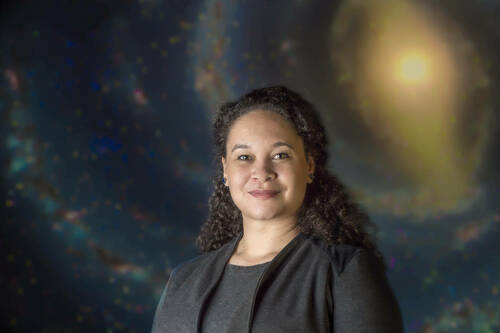
L. Arielle Phillips, research assistant professor in the Department of Physics at the University of Notre Dame, has been named a fellow of the National Society of Black Physicists (NSBP).
She was primarily recognized for her work teaching an algebra-based physics program at Westville Correctional Facility through the Moreau College Initiative Physics Program, where students can obtain a degree from Holy Cross College. She was the only member elevated to fellow in 2020.
“This is an unexpected recognition of the work I have done,” Phillips said. “You know when you are working toward something that you will either make an impact that is felt, or an impact that is known, and you can get great satisfaction when your impact is felt even if it is not known ... but it is a pleasant development when your work is recognized.
“So I was honored to be recognized as a fellow. I am doing things here that will impact my students and my field, which was an impact that is felt — but then this happened.”
In introducing Phillips’ elevation, Stephon Alexander, president of the NSBP, praised her for the Westville program she has been involved with since 2014, in addition to her co-production of High Z, an international collaboration of scientists and artists. He noted that she fulfilled these roles while leading an active research program in theoretical astrophysics.
The physics course she teaches is part of a liberal arts program for which those who are incarcerated across Indiana can apply, and transfer to if accepted.
The program consists of three algebra-based courses (mechanics, physics of civilization and astronomy). After an anonymous benefactor generously provided funding, Phillips and her team launched labs housed at the facility to match each of these courses. Coursework was temporarily suspended this year because of COVID-19 restrictions.
Naturally, teaching in a prison setting is vastly different from teaching at a university. Lack of Wi-Fi and restrictions on what she and graduate students may bring into the facility — and the time it takes to have materials cleared for entry — have created their own challenges, Phillips said.
“In the beginning we tried to do something that was really makeshift. I would bring in a tub of physics equipment, but I always had to have two to three ideas, because some equipment would not work,” she said. “Bringing in items could change what time I would start class dramatically, because sometimes they were intaking new inmates, and you never knew what you would come across.” But her students were always waiting for her when she arrived, and worked with her to make the labs successful.
Supplies are now left at the prison, allowing for faster entry, she said.
She is proud that her work to educate prisoners was recognized by the NSBP, describing her elevation to fellow as an honor.
“I remember going to my first meeting, and enjoying the community. It is an organization that I respect so much,” she said.
She joins a cohort of NSBP fellows elevated in the past, including Sylvester James Gates, the Brown Theoretical Physics Center Director at Brown University and former member of President Barack Obama’s Council of Advisors on Science and Technology, and Hattie Carwell, a physicist with the U.S. Department of Energy and the International Atomic Energy Agency.
Michael Hildreth, interim dean of the College of Science at Notre Dame, said he has always appreciated Phillips’ attention to education, diversity and the underserved, and regards her as a leader in engagement and outreach.
“Our department and indeed our local and national communities are richer by virtue of her efforts,” Hildreth said.
Originally published by at science.nd.edu on Nov. 12.